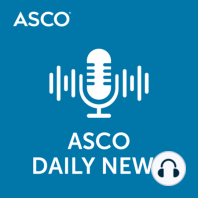12 min listen
Spotlight on Immunotherapy at ASCO23
FromASCO Daily News
ratings:
Length:
34 minutes
Released:
Jun 26, 2023
Format:
Podcast episode
Description
Drs. Diwakar Davar and Jason Luke discuss KEYNOTE-716, KEYNOTE-942, RELATIVITY-047, and other key advances in melanoma, including the promise of mRNA vaccines in melanoma and potentially other cancers, as well exciting advances in neoadjuvant therapies across malignancies featured at the 2023 ASCO Annual Meeting. TRANSCRIPT Dr. Diwakar Davar: Hello, and welcome to the ASCO Daily News Podcast. I'm your guest host, Dr. Diwakar Davar. I'm an associate professor of medicine and the clinical director of the Melanoma and Skin Cancer Program at the University of Pittsburgh Hillman Cancer Center. I'm delighted to have my colleague and good friend Dr. Jason Luke on the podcast today to discuss some practice-changing studies and other advances in immunotherapy that were featured at the 2023 ASCO Annual Meeting. Dr. Luke is an associate professor of medicine, the director of the Cancer Immunotherapy Center, as well as the associate director of clinical research at the University of Pittsburgh's Hillman Cancer Center. You can find both of our disclosures in the transcript of this episode, and disclosures of all guests on the ASCO Daily News Podcast are available on our transcripts at asco.org/DNpod. Jason, there was a lot of exciting data in the immunotherapy space highlighted at the Annual Meeting, and it's great to have you back on the podcast to discuss some of this work. Dr. Jason Luke: Thanks for having me. Dr. Diwakar Davar: So, the abstracts that we had selected have several key themes. We'll be covering some of the early advances in melanoma in the stage 2 and stage 2B/C space with KEYNOTE-716. I think this is a study that you know a little bit about seeing you are the presenting author and the principal investigator for the study, as well as the pivotal KEYNOTE-942 trial. And then going on to themes with using third-generation checkpoints, neoadjuvant therapy in non-small-cell lung cancer, and cutaneous squamous cell carcinoma. But we'll start with KEYNOTE-716. So, this is LBA9505, the study which evaluated pembrolizumab versus placebo as adjuvant therapy in stage 2B and stage 2C melanoma patient population for which historically there was no real effective therapy other than remotely interferon. And these are the final results of the DMFS analysis from this phase 3 trial. So, Jason, what are your thoughts about this, and can you contextualize the results relative to the recent publication? Dr. Jason Luke: Thanks. I think the important point to level set on this was just a few years ago; this was a population of patients that we didn't treat in clinic. In fact, sometimes they weren't even referred to medical oncology for evaluation. And that was despite the fact that we knew from historical data that the risk of melanoma-specific survival, death from melanoma, was just as high for this population of patients as it was for the patients with stage 3 melanoma, where obviously adjuvant immunotherapy has been a standard for quite some time. And so we launched this clinical trial, KEYNOTE-716. It was a global, randomized phase 3 study of almost 1,000 patients, randomizing patients to either get pembrolizumab or placebo. Importantly, these patients being those with deep primary lesions, stage 2B and 2C with negative sentinel lymph node evaluation. People will recall that this study hit its primary endpoint on the first protocol-specified analysis at a year. And what we updated at ASCO this year was the final analysis of distant metastasis-free survival. Obviously, an important secondary endpoint because if patients eventually going to develop metastatic disease and pass away, it's the distant metastasis that we worry about. And what we saw in this trial with a landmark 36-month follow-up median of 39 months was that the benefit was increasing. In other words, the magnitude of the hazard ratio change was increasing over time as would be expected, such that at this analysis there was a 41% reductio
Released:
Jun 26, 2023
Format:
Podcast episode
Titles in the series (100)
Hot Topics and Abstract Highlights From #GI22: Guest host, Dr. Muhammad Shaalan Beg, director for Gastrointestinal Medical Oncology at UT Southwestern's Harold C. Simmons Comprehensive Cancer Center and Dr. Manisha Palta, radiation oncologist at the Duke University Health System in North Carolina... by ASCO Daily News
